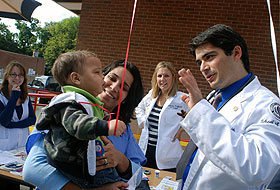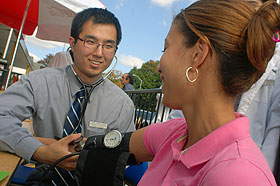Feature Story
As published in the UConn Advance, September 29, 2008.
Health Center Marks Primary Care Week with Focus on Prevention
By Chris DeFrancesco

Rod Ghassemzadeh, right, a second year medical student and site leader at the C-Town Supermarket in Hartford, entertains one of the younger participants during the community service day. Looking on are, left, Charlotte Scherr, a UConn pharmacy student, and Lindsay Hatfield, center, a student in the Physician Assistant Program at Quinnipiac University.
Photo by Janine Gelineau
Through health fairs, hands-on clinics, and seminars, nearly 100 UConn medical, dental, nursing, and pharmacy students got a taste of a career in primary care during the University’s observance of National Primary Care Week, Sept. 20-27.
The week included a day dedicated to community service, when the students staffed 10 health fairs that ran concurrently in Hartford, Wethersfield, and Willimantic.
Community clinicians and Quinnipiac University physician assistant students joined them in offering free services such as blood pressure and blood glucose screenings as well as preventive health education materials.
“The Power of Prevention” was this year’s Primary Care Week theme. Guest lecturers included Katherine Kranz Lewis, an assistant professor in nursing at the University of Hartford, who told the students the reimbursement structure undervalues preventive care.
“This distortion in payment for care devalues primary care and prevention, and compromises care for vulnerable populations,” Lewis said.
“There’s a need to align incentives for primary care that match the potential cost savings. For example, reimbursement for prevention and a change in focus from illness to health can go a long way in achieving the tremendous benefits that primary care has to offer.”
Dr. Bruce Gould, associate dean for primary care at the UConn School of Medicine and director of the Connecticut Area Health Education Center at the Health Center, said preventive medicine is neglected when health coverage is inaccessible or health care is unaffordable.
“As the cost of health care skyrockets, the first thing to go is the basic prevention and care of minor problems that can prevent progression to more serious conditions,” Gould said.
“When people forego preventive care, not only do they suffer, but it also places an added burden on the health care system. Unfortunately, it seems as though as a society we’ve lost our sense that we have a responsibility to our neighbors.”
A survey published in the Sept. 10 issue of the Journal of the American Medical Association found only 2 percent of graduating medical students saying they plan to pursue general internal medicine.

Hee Seop Shin, a second-year medical student, takes a blood pressure reading at C-Town Supermarket in Hartford, part of a day dedicated to community service during National Primary Care Week.
Photo by Janine Gelineau
A similar survey in 1990 found 9 percent with plans to work in primary care internal medicine. Family medicine and general pediatrics fared only slightly better, with 5 percent and 12 percent of students planning to pursue those areas of primary care practice.
The study’s authors suggest that factors keeping future doctors away from primary care include time demands and the more attractive salaries available to specialists.
The average medical school graduate carried $140,000 in student debt last year, according to the Association of American Medical Colleges.
In that context, one of the goals of National Primary Care Week is to appeal to students’ sense of the importance of community-responsive primary care by celebrating the contributions of primary care to the country’s health.
“The students are encouraged to collaborate as members of future primary health care teams and work to reduce problems with healthcare access that underserved populations experience,” Gould said.
Charles Huntington, associate dean for community and continuing education at the UConn School of Medicine and a former federal health policy lobbyist, said effective advocacy is an important part of the effort to improve the current state of health care.
“The range of advocacy tools offers health professionals the opportunity to choose their level of involvement in the legislative process,” said Huntington, who spoke about health care advocacy at a lunchtime seminar during Primary Care Week.
“The most effective methods all involve a degree of relationship-building with legislators and their staff members.”
In remarks at UConn’s Primary Care Week banquet, State Senate President Pro Tem Donald Williams Jr. (D-Brooklyn) told the students they are filling a critical need.
“Primary care is the backbone of our healthcare system,” he said.
“Without a primary care system that works, we cannot hope to improve our quality and reduce costs.”
National Primary Care Week is observed by institutions throughout the country, with the dates varying by school.


